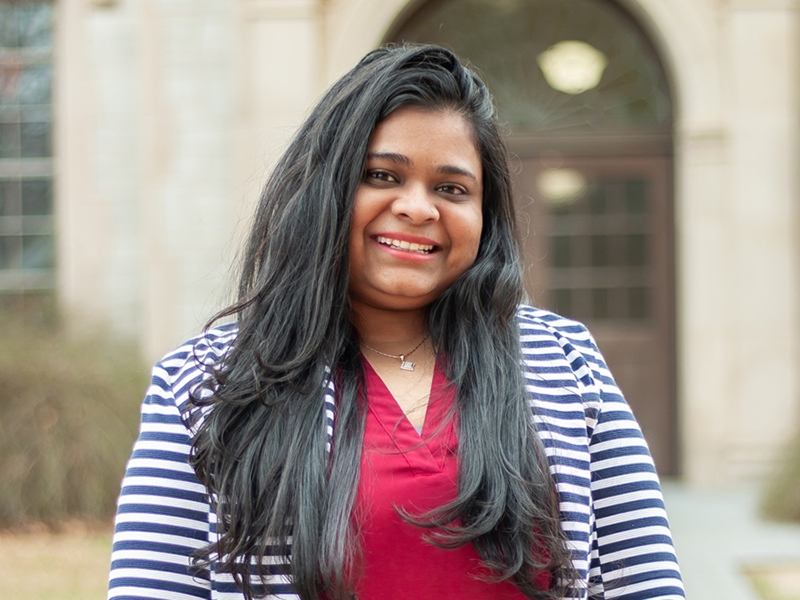Shilpi Agrawal was in pursuit of academic excellence.
After finishing bachelor's and master's degrees in biochemistry from universities in India, Agrawal wanted to study at a top academic institution in the United States that would take her research and expertise to the next level. Growing up in Ahmedabad, India, she saw challenges in her country's healthcare system and pursued higher education to help others live healthier lives.
Agrawal was accepted to several major U.S. universities but chose the University of Arkansas based on a recommendation from her master's thesis advisor for the U of A's stellar research reputation, specifically in protein chemistry. That decision has paid dividends, as Agrawal earned her Ph.D. in biomedical engineering and now works as a postdoctoral researcher in the Biomedical Engineering Department.
"My immediate connection with Fayetteville, especially its weather and nature, made my first semester unforgettable," she said. "Exploring the beauty of fall and the proximity to nature, courtesy of my Furniture Friends' group, created lasting memories. The diverse and welcoming community at U of A, particularly the culturally rich atmosphere, has made my academic journey exceptionally rewarding."
During her time as a doctoral student, Agrawal fostered strong connections with peers and professors through events and programming including welcome lunches and Reading Day parties. In collaboration with mentor Suresh Kumar Thallapuranam, professor of biochemistry, Agrawal expanded her network and conducted research into a protein called FGF1, which acts as a "natural repair kit" to help the body heal wounds.
Agrawal upgraded the protein to what she calls a "super FGF1," which is more effective and durable at healing the body. Her research has resulted in several publications and patents, as well as an Innovator's Award.
"The super FGF1 can withstand different conditions much better than the original protein," she said. "Imagine it like a superhero version of the protein that doesn't easily get affected by changes in its environment. This discovery could lead to better ways of helping our bodies heal faster and more effectively, especially when it comes to treating wounds."
She also became involved in several organizations, including the Biophysical Society and Arkansas Integrative Metabolic Research Center.
"I actively pursued diverse opportunities," she said. "Dr. Kumar's support and mentorship ensured my successful engagement in these organizations, aligning with my future plans."
When Agrawal neared graduation, she learned about the research being conducted by Christopher Nelson, assistant professor of biomedical engineering, who explored gene editing to treat muscular dystrophy. She saw an opportunity to apply her research in a new way and joined his lab as a postdoctoral researcher after graduation.
"Considering my background in protein chemistry, this innovative approach caught my attention, and I was eager to explore this new avenue of research," she said. "It presented a unique opportunity to broaden my expertise and contribute to cutting-edge advancements in gene editing and therapeutic treatments for genetic disorders like Duchenne muscular dystrophy."
This year, she received a Women's Giving Circle Grant from the university for her research. Long term, she plans to transition into a professor role at a university setting, a job she is well-prepared for thanks to her time at the U of A.
"Attending the University of Arkansas has been a transformative journey for me," she said. "The rich research environment, the support from my advisors, and the opportunities to delve into cutting-edge projects have not only expanded my knowledge but have also shaped my passion for scientific exploration. I am truly thankful for the valuable experiences and the chance to contribute to meaningful research at this esteemed institution. It's been a rewarding chapter of growth, and I look forward to carrying forward the skills and insights gained here into the next phase of my scientific endeavors."
Topics
Contacts
John Post, director of communications
Graduate School and International Education
479-575-4853,
